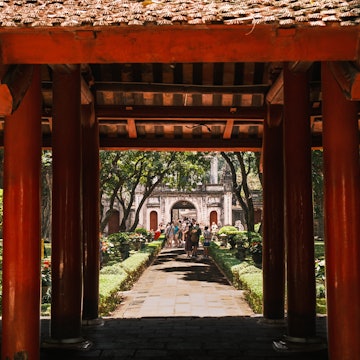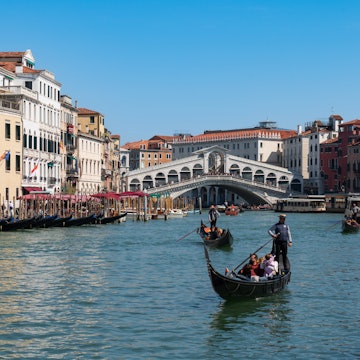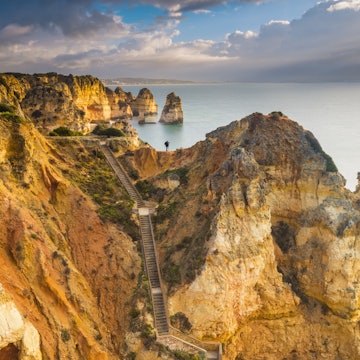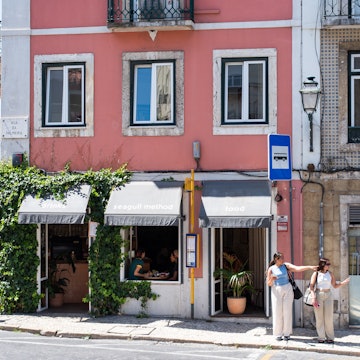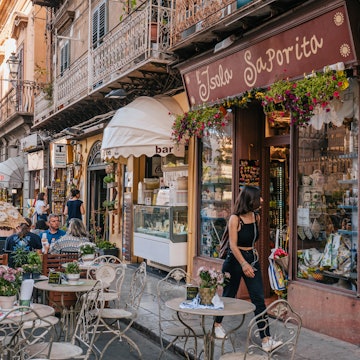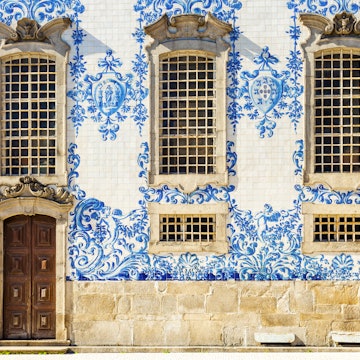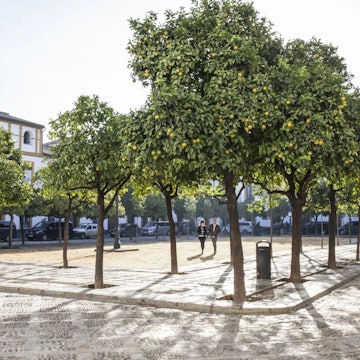

The Alfanzina lighthouse on the Seven Hanging Valleys Trail in Lagoa, in the Algarve region of Portugal. vane_hinausindiewelt/Shutterstock
Daniel is the writer of Lonely Planet's Pocket Algarve. Here he shares his local tips on how to make your money go further.
Long known for easy-going, summer holiday fun, Portugal’s southern, sun-kissed Algarve region has seen a flurry of luxury resorts and upscale restaurants open in recent years. Pair this with a general increase in costs across Portugal – and the sharp rise in peak-season accommodation prices – and it’s admittedly no longer as wallet-friendly in summer. Still, with the region offering excellent value in nearly every other way, it’s very much possible to visit the Algarve on a budget with some planning.
Many of the Algarve’s top things to do are free or low-cost. Delicious fresh fish and regional recipes are inexpensive at local restaurants. And days can be spent without spending a cent by lounging on countless incredible beaches or exploring nature reserves. No matter the season, these money-saving tips will help you maximize your Algarve budget.
Skip the summer holidays for substantial savings
The Algarve’s gorgeously golden beaches are understandably its long-standing summer allure, but if you’re budget-conscious and able to, plan a visit outside of the main school holidays (July, August and Easter). Unlike Lisbon and Porto, the Algarve remains highly seasonal – even though it’s sunny for around 300 days per year – and you can often score the same hotel in sun-kissed April or October for around 50% cheaper, while winter deals are even more affordable.
The savings soon add up when you add in the fact that a week’s car rental (before insurance) in winter can cost just €50 (US$60), most parking charges are suspended between October and May, and bargain flights are usually plentiful outside of high season. Even most municipal tourist taxes (paid per person, per night) are halved to €1 between November and March.
Compare airfare to Faro, Lisbon and Seville in summer, or if you’re traveling from further afield
Faro International Airport is well-served by multiple budget carriers from across Europe and offers limited flights from North America. For much of the year, with flexibility on dates, finding affordable airfare is straightforward. However, when prices surge in summer, check the cost difference of flying into Lisbon (3 hours and 30 minutes by Intercidades train; from €12/US$14 in advance) or Seville, Spain (2 hours and 45 minutes by Flixbus; from €15/US$17.50). The savings might make it worth considering a twin-destination vacation.
For travelers outside Europe, Lisbon is often a more affordable arrival point year-round, due to the vastly higher number of long-haul routes. BlaBlaCar, a carpooling app, can be another inexpensive and local-meeting way to arrive from major cities in Spain and Portugal.
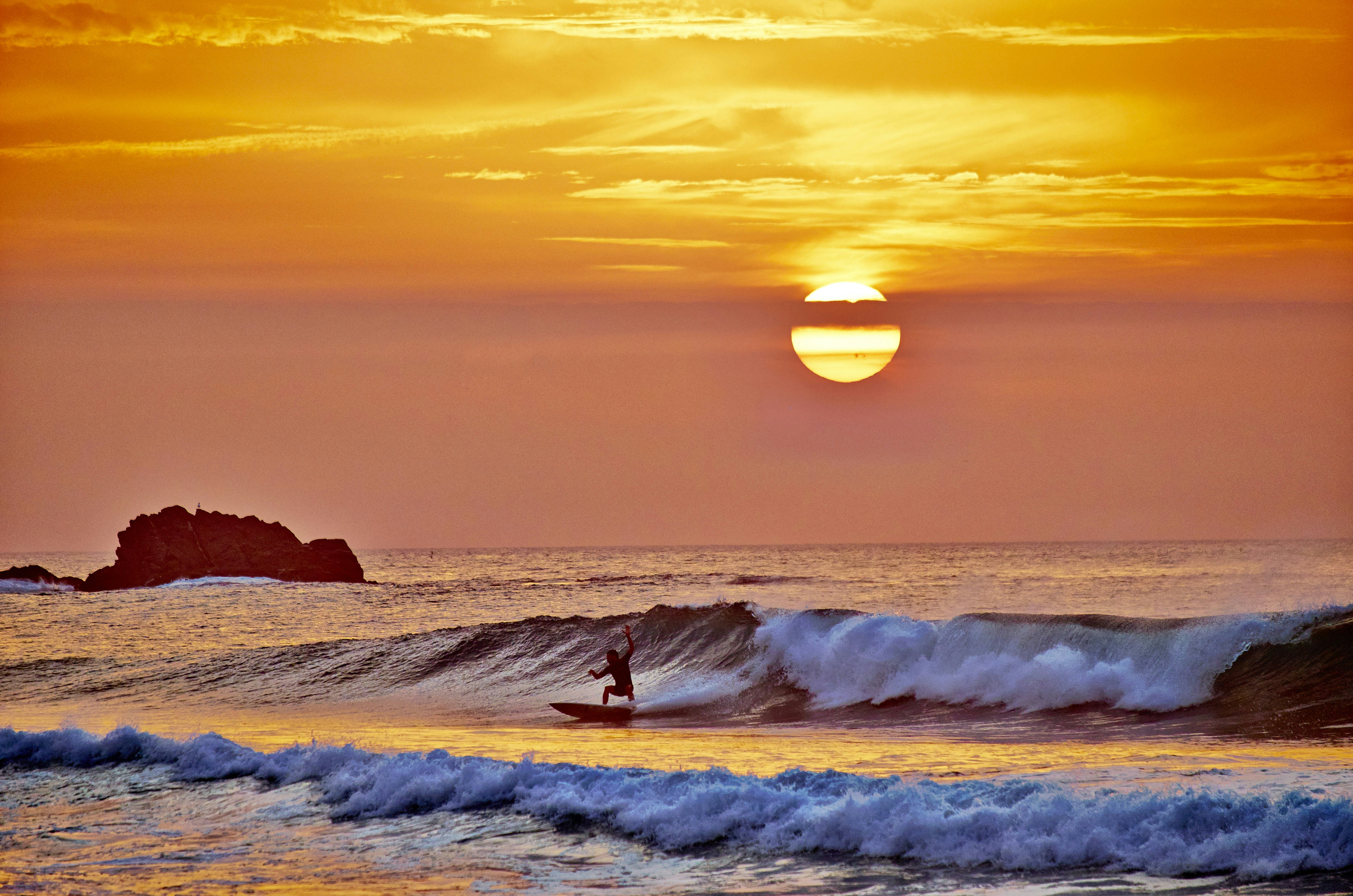
Save on accommodations by booking ahead and looking beyond the holiday hot spots
Base yourself anywhere on the Algarve’s coast, and you’ll never be far from a beautiful beach, meaning easy savings can be made by looking beyond the most popular destinations. You can always mitigate costs in well-known beach towns like Albufeira and Lagos by booking hostels (which are generally high-quality in Portugal) or family-run guesthouses, but you’ll usually get more bang for your buck by staying slightly inland to the east or on the west coast. Prices for both accommodation and dining are generally lower there – though you’ll need to book well in advance due to lower supply.
Bringing a tent is another terrific way to save in summer; pitches and facilities at Orla on Ilha de Tavira, for example, start from €28 (US$33) for two people. If you’re visiting for the Algarve’s excellent surfing, check camps for combined packages; a week in a dorm with daily lessons at Sagres Natura starts from €400 (US$470). For the best value base in terms of accommodations, dining and connections, consider a city or look inland to the likes of Olhão, Faro, and Loulé. In Portimão, for example, accommodations are usually more affordable, Praia da Rocha is a nearby beach (a weekly city bus pass costs €15) that's on the train line, making it a good base for day trips.
Pick pastelarias for breakfast over pre-booking pricey hotel buffets
Portuguese pastelarias (pastry shops that double as cafes) are the go-to for breakfast or a light lunch. Start the day with uma bica (espresso) or galão (latte) paired with a pastel de nata (custard tart) or tosta mista (ham and cheese toastie), and it will only cost a few euros. Plus, you’ll be able to try all the different regional sweet treats every day.

Check for free cultural events and plan around big celebrations
All Algarve municipalities host multiple free events and activities throughout the year. It’s always worth scanning Visit Algarve’s calendar for an affordable way to experience Algarvian culture and heritage, whether through birdwatching, an immersive medieval festival, or a culinary celebration. Some of the larger events, such as Loulé Carnival, Carvoeiro’s start-of-summer Black and White Night, and Portimão's summer Sardine Festival or Albufeira's NYE Party – both often with big-name Portuguese performers – can even be worth planning your trip around.
Use Vamus’ pre-paid app for buses and only buy tourist passes for intensive itineraries
Getting around the Algarve without a car, especially to the main attractions and towns, is straightforward and inexpensive. Two regional travel passes are available: the Algarve-only Rail Tourist Travelcard (from €21.90/US$25.80 for two days) and Vamus Buses Tourist Pass (from €35/US$41 for three days). Note that the savings only add up if you’re covering a lot of ground quickly or planning to use the more expensive Vamus Aerobus56 on arrival and departure, as it’s included in the base price.
If you plan to make a handful of local trips by bus, score the cheapest, discounted tickets by creating and topping up an account on the Vamus app and paying by scanning the QR code when boarding. As all rail services in the Algarve are regional, there’s no need (or savings) to book in advance, though children under 12 and adults over 65 receive a 50% off rail fare.
Consider if you need a car rental and cut costs with pre-planning
If you’re planning a road trip to the west coast or interior villages where public transport is limited, it can make sense to rent a car, and there are some ways to save even in summer. Rentals in Portugal are per 24 hours, not daily, so by thoughtfully selecting pick-up and drop-off times (especially if you plan to spend a day in Faro), you can save a day’s rate. Airport collections have an airport-imposed €15 fee, which can be avoided by using one of the shuttle-connected hire firms. The good news is that the Algarve’s A22 motorway has been toll-free since 2025, though fuel costs are still relatively high; supermarkets are usually the most competitively priced place to fill up.
An alternative and more affordable option is to rent a 125cc scooter (prices are nearly always cheaper as a multi-day rental from Faro than in local towns) or to rent a bicycle in your destination. In recent years, there has been significant investment in new cycle routes in the eastern and western Algarve.

Plan a human-powered adventure (or entire vacation) for nature-surrounded savings
To stretch your budget further while appreciating the region’s fauna and flora, consider planning your entire vacation around one of the Algarve's multi-day, long-distance hiking routes: the interior-crossing Via Algarviana or the Rota Vicentina’s Fishermen’s Trail, which tracks the wild beaches and cliffs of the west coast. Not only will you minimize transport costs, but these trails – best tackled in spring or fall – are far from the holiday crowds, meaning the simple guesthouses and local restaurants en route are usually much more reasonable, while the scenery is priceless.
Don’t assume ride-hailing is always cheaper, and don’t use large taxis unless necessary
Taxis and ride-hailing services, such as Bolt and Uber, are plentiful along the coast. During surge pricing, metered taxis sometimes cost the same or less than ride-hailing for short to medium distances. If you take a taxi from a stand, be aware that the larger six-seat taxis always incur a surcharge, regardless of the number of passengers. Shared transfers from the airport (bookable online in advance) are the most cost-effective option for solo travelers arriving too late to make public transportation connections.

Forgo boat tours and opt for ferries to the islands instead
Dolphin watching trips, sunset cruises, and cave-touring boats can be the highlight of an Algarve vacation, but the costs soon add up. For a more affordable ocean experience, use the local ferries to reach the Parque Natural da Ria Formosa’s sandy islands – a return ticket can be under €5.
Olhão is the central hub for ferries into the expansive nature park. But there are also connections from Tavira to Ilha de Tavira – the western end of which can be accessed on foot via a bridge near Santa Luzia for free – and the sandy peninsula of Praia de Faro, also reachable by bus and cycle paths. Kayak rentals or tours are usually half the price of boat trips and provide a more up-close appreciation of Benagil Cave or Ponta da Piedade.
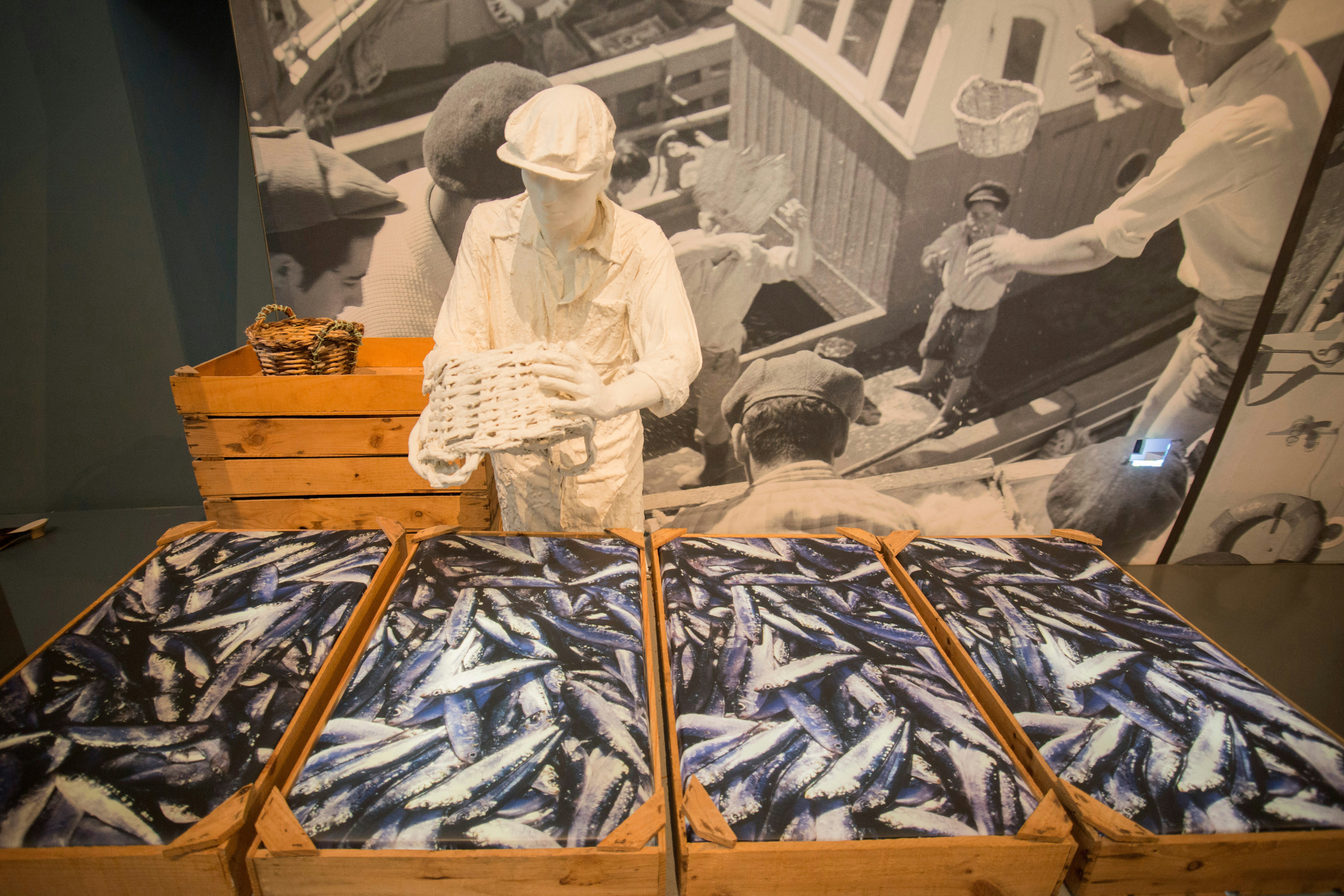
Make the most of affordable museums and combined city tickets
Nearly all museums in the Algarve are operated by local councils, meaning low ticket prices. For under €3, you could visit the Roman Ruins of Milreu, tour the sardine-focused Museu de Portimão, or marvel at Moorish artifacts in Silves’ Museu Municipal de Arqueologia. While there isn’t a region-wide tourism card, you can save money by buying combined city tickets for Faro’s two museums, Tavira’s churches, or Silves’ Castle and museum. The exception is Fortaleza de Sagres, whose price doubled in 2024 (to €10) along with all other nationally run monuments and museums.
Tickets are usually half-price for children under 12, adults over 65, and students. Some attractions also offer family tickets. For waterparks or boat trips, pre-booking online usually earns a 10% discount.
Dine on local dishes at tascas, churrasqueiras and snack bars for an affordable feast
For the best value meals, look for tascas (small, family-run local restaurants), churrasqueiras (grill house) or snack bars, and order regional and Portuguese dishes. Chicken piri-piri, sardinhas assadas (grilled sardines), and bitoque (steak with egg, fries, and usually rice) are all typical, filling dishes, often costing less than €10 at local spots. Fish, such as dourada (bream) or robalo (bass), is always fresher and more affordable than bacalhau (salted cod fish), Portugal’s most beloved fish, which is imported from the North Atlantic. Plan to enjoy your largest meal at lunchtime, when more restaurants offer a lower-priced prato or menu do dia (dish or menu of the day).
Feel free to send back the couvert
Across Portugal, meals often begin with couvert, typically consisting of bread, olives and pates, and sometimes accompanied by cenoura à algarvia (delicious marinated carrots) or cheese. These are served unrequested, but will be charged if consumed. While very much a cultural norm (and often a filling, affordable starter) rather than a scam, the cost of couvert has been creeping up in highly touristed areas, where some restaurants are charging over €6 for what should cost a couple of euros at most. Check the menu, and if you feel it’s not reasonably priced or you simply don’t want it, politely decline.
Winery tastings can be cheaper than ordering a local bottle while dining
The Algarve wine region isn’t as lauded as the Douro or Alentejo, meaning winery tastings and vineyard tours are often an affordable afternoon activity, rather than an out-of-reach experience. Albufeira, Faro, and Lagos all have visitable producers. However, the highest concentration is found around Lagoa and Silves, where you can enjoy a tour and tasting for under €20 (US$24) at Monte de Salicos or Quinta do Francês. Often, this is cheaper than trying a bottle of regional wine at a restaurant, as the Algarve’s smaller production means the affordable vinho de casa (house wine) is nearly always from further north.

Pick up a picnic at the market, but stock up at supermarkets
If you’re self-catering, it’s worth heading to a larger out-of-town supermercado for a start-of-vacation stock-up. Budget chains such as Lidl and Aldi, alongside supermarkets like Pingo Doce, Continente, and Auchan, offer competitive pricing and a wider choice. Apolónia is an upscale, Algarve-only chain that stocks a wide range of international items – great for keeping little picky eaters happy, but much pricer.
If you’re looking for fresh fruits, vegetables or fish – or to craft a picnic – shop local at the characterful mercados that are open in most towns from Monday to Saturday. Too Good to Go, an app that aims to reduce food waste, is excellent for scoring an end-of-day bargain spread of Portuguese pastries.
Always carry cash and avoid white label ATM fees
At many Algarvian businesses, cash remains king, leading to a proliferation of white-label ATMs across the region. Avoid excessive withdrawal fees by using official bank machines. Even if you spot a local using one of the private ATMs, don’t assume it’s a fair fee; Portuguese cards work on a different network that isn’t subject to charges.
Bring your refillable water bottle
Nearly all tap water is potable (unless you're staying in an older or rural property that uses tanks or boreholes), and refilling your bottle will save a few euros a day. You could even head to Caldas de Monchique’s springs for a complimentary mineral water refill.
Daily costs
High-season, coastal hostel dorm: €25-40 (US$29-47)
Low-season, private room in a basic hotel: €30-80 (US$35-93)
Daily car rental: €7-50 (US$8-58)
One-way ferry ticket to the Ria Formosa’s Islands: €2.30 (US$2.70)
One-way train ticket from Faro to Lagos: €8.10 (US$9.50)
Renting a parasol and two loungers on Ilha de Tavira: €15 (US$17.50)
Entry ticket to most local museums, such as the Roman ruins of Milreu: €2 (US$2.35)
Wine tasting and tour at Quinta do Francês in Silves: from €13.50 (US$15.80)
One-hour kayak tour to Benagil Cave: €25 (US$29.20)
Cataplana de Marisco for two at Cantinho in Faro: €45 (US$53)
Espresso and a pastel de nata at a local pastelaria: €2.50 (US$2.90)
Half portion of chicken piri-piri with fries at Ramires in Guia: €7.50 (US$8.77)
Take your Portugal trip with Lonely Planet Journeys
Time to book that trip to Portugal
Lonely Planet Journeys takes you there with fully customizable trips to top destinations–all crafted by our local experts.

















